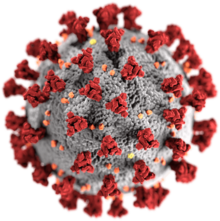COVID-19 pandemic in Antarctica
Antarctica is the only continent with no confirmed cases of coronavirus disease 2019 amid the COVID-19 pandemic.[1][2][3]
| COVID-19 pandemic in Antarctica | |
|---|---|
| Disease | COVID-19 |
| Virus strain | SARS-CoV-2 |
| Location | Antarctica |
| First outbreak | Wuhan, Hubei, China |
| Part of a series on the |
| COVID-19 pandemic |
|---|
 |
|
|
|
International response |
|
Medical response |
|
|
|
Background
On 12 January 2020, the World Health Organization (WHO) confirmed that a novel coronavirus was the cause of a respiratory illness in a cluster of people in Wuhan, Hubei, China, which was reported to the WHO on 31 December 2019.[4][5]
The case fatality ratio for COVID-19 has been much lower than SARS of 2003,[6][7] but the transmission has been significantly greater, with a significant total death toll.[8][6]
Antarctica
People coming to Antarctica research stations have to undergo isolation and COVID-19 screening.[1] The Antarctica research stations of Australia and Germany have respirators; it remains unconfirmed whether the research stations of the U.S. and Britain have them.[1] The British Antarctic Survey implemented precautionary measures.[9]
The impact of the coronavirus pandemic on travel caused complications with evacuating British Antarctic Survey personnel from the continent.[10]
In April 2020, a cruise ship headed for Antarctica had almost sixty percent of its passengers test positive for COVID-19.[11][12]
As of 14 April 2020, bases in Antarctica contain only skeleton crews, visitors have been limited, and scientific research has been impacted.[13]
Several conferences on the topic of Antarctica that had been planned for mid-2020 were cancelled due to the pandemic.[14]
References
- Taylor, Adam; Pitrelli, Stefano (March 24, 2020). "One continent remains untouched by the coronavirus: Antarctica". The Washington Post. Retrieved April 3, 2020.
- Torres, Elle (March 20, 2020). "What life is like on Antarctica, the only continent without a case of coronavirus". ABC News. Retrieved April 3, 2020.
- Agence France-Presse (March 31, 2020). "Pacific islands, Antarctic bases: coronavirus-free living in some of Earth's most isolated places". South China Morning Post. Retrieved April 3, 2020.
- Elsevier. "Novel Coronavirus Information Center". Elsevier Connect. Archived from the original on 30 January 2020. Retrieved 15 March 2020.
- Reynolds, Matt (4 March 2020). "What is coronavirus and how close is it to becoming a pandemic?". Wired UK. ISSN 1357-0978. Archived from the original on 5 March 2020. Retrieved 5 March 2020.
- "Crunching the numbers for coronavirus". Imperial News. Archived from the original on 19 March 2020. Retrieved 15 March 2020.
- "High consequence infectious diseases (HCID); Guidance and information about high consequence infectious diseases and their management in England". GOV.UK. Archived from the original on 3 March 2020. Retrieved 17 March 2020.
- "World Federation Of Societies of Anaesthesiologists – Coronavirus". www.wfsahq.org. Archived from the original on 12 March 2020. Retrieved 15 March 2020.
- "British Antarctic Survey response to COVID-19". British Antarctic Survey. March 24, 2020. Retrieved April 3, 2020.
- Amos, Jonathan (7 April 2020). "Coronavirus complicates journeys home from Antarctica". BBC News. Retrieved April 20, 2020.
- Griffiths, James; Castillo, Jackie (April 8, 2020). "Passengers to be evacuated from Antarctic cruise ship after almost 60% test positive for coronavirus". CNN. Retrieved April 20, 2020.
- Al-Arshani, Sarah (April 9, 2020). "Nearly 60% of the passengers on an Antarctic cruise ship have tested positive for the coronavirus". Business Insider. Retrieved April 20, 2020.
- Laing, Aislinn; Garrison, Cassandra (April 14, 2020). "'Isolated within isolation': keeping out coronavirus in the frozen Antarctic". Reuters. Retrieved April 20, 2020.
- "International Antarctic conferences cancelled due to coronavirus". Australian Antarctic Division. March 19, 2020. Retrieved April 3, 2020.